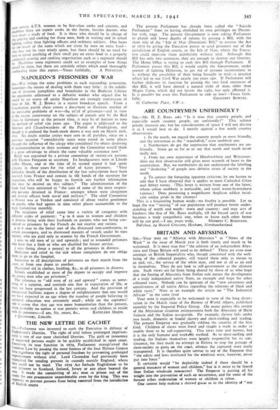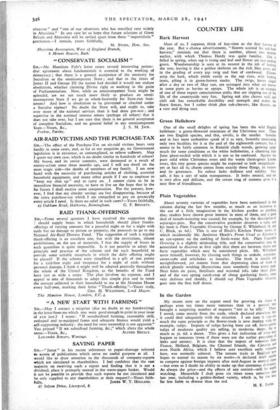BRITAIN AND ABYSSINIA Stu,—Your note on " Alliance with Abyssinia
" in " News of the Week " in the issue of March 21st is both timely and much to be welcomed. It is most true that " the relation of an independent Abys- sinia and Great Britain will need to be defined." There are even now amongst us British Imperialists who, though concerned with the well- being of the coloured peoples, still regard them only as means to an end, viz., the service of the white man, and not at all as an end in themselves. They do not look to self-government as the ultimate aim. Such views are far from being shared by those of us who hope that the freeing of Abyssinia from Italian rule means the development of a truly independent native State, an example and hope for other coloured races. Nobody can be ignorant of the " new awareness and sensitiveness of all native Africa regarding the relations of black and white races." Note as an example the article on " The Industrial African" in the same issue Your note is especially to be welcomed in view of the long disser- tation in the March issue of the Review of World Affairs, published monthly by the Imperial Policy Group. On many points this review of the Abyssinian situation misrepresents both the Abyssinia of Haile Selassie and the Italian occupation. Fos. example, slavery falls under two heads, domestic or feudal slavery and slave-raiding and trading. The present Emperor was gradually ridding the country of the first kind. Children of slaves were freed and taught a trade in order to enable them to be self-supporting. This takes time and money, but it is the only humane and workable method. As to slave-raiding and trading, the Italians themselves were largely responsible for its con- tinuance, for they made no attempt in Eritrea to stop the passage of slave-raiders to ports on the coast, whence the captured were easily transported. It is therefore quite untrue to say of the Emperor that " the edicts and laws instituted for the abolition were. however, never put into force."
It certainly would " be deplorable indeed if there should be a general massacre of women and children," but is it more to be feared than Italian wholesale massacres? The Emperor is putting all his weight into the prevention of such an occurrence, and for some of the fiercest tribes molestation of women or children is taboo.
One cannot help making a shrewd guess as to the identity of " our observer " and " one of our observers who has travelled very widely in Abyssinia." In any case let us hope that future relations of Great Britain and Abyssinia will be settled apart from these " imperialistic " gentlemen.—I remain, yours faithfully,
M. STORK, Hon. Sec.
Abyssinia Association, West of England Branch, 6 Mount Beacon, Bath.































 Previous page
Previous page